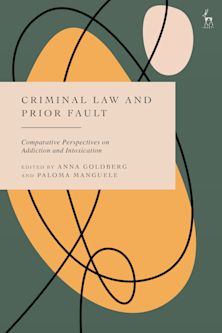- Home
- ACADEMIC
- Law
- Criminal Law
- Trial and Error in Criminal Justice Reform
Trial and Error in Criminal Justice Reform
Learning from Failure
- Textbook
Trial and Error in Criminal Justice Reform
Learning from Failure
- Textbook
Exam copy added to basket
Choose your preferred format. Please note ebook exam copies are fulfilled by VitalSource™.
Buy from Bloomsbury eTextBooks
You are now leaving the Bloomsbury Publishing website. Your eBook purchase will be with our partner https://www.vitalsource.com.
Your credit card statement will show this purchase originating from VitalSource Technologies. They will also provide any technical assistance you might require.
You must sign in to add this item to your wishlist. Please sign in or create an account
Description
In this revised edition of their concise, readable, yet wide-ranging book, Greg Berman and Aubrey Fox tackle a question students and scholars of law, criminology, and political science constantly face: what mistakes have led to the problems that pervade the criminal justice system in the United States? The reluctance of criminal justice policymakers to talk openly about failure, the authors argue, has stunted the public conversation about crime in this country and stifled new ideas. It has also contributed to our inability to address such problems as chronic offending in low-income neighborhoods, an overreliance on incarceration, the misuse of pretrial detention, and the high rates of recidivism among parolees. Berman and Fox offer students and policymakers an escape from this fate by writing about failure in the criminal justice system. Their goal is to encourage a more forthright dialogue about criminal justice, one that acknowledges that many new initiatives fail and that no one knows for certain how to reduce crime. For the authors, this is not a source of pessimism, but a call to action. This revised edition is updated with a new foreword by Cyrus R. Vance, Jr., and afterword by Greg Berman.
Table of Contents
Foreword
Introduction
1 The Four Types of Failure
2 Failure amid Success
3 The Complicated Legacy of Operation Ceasefire
4 The Billion-Dollar Failure: Parole and the Battle for Reform in California
5 Beyond Simple Solutions:Mastering the Politics of Tragedy in Connecticut
6 Defining Failure
Conclusion
Afterword
Notes
References
Index
About the Authors
Product details
| Published | Mar 21 2016 |
|---|---|
| Format | Ebook (Epub & Mobi) |
| Edition | 1st |
| Extent | 164 |
| ISBN | 9781442268487 |
| Imprint | Rowman & Littlefield Publishers |
| Series | Urban Institute Press |
| Publisher | Bloomsbury Publishing |
About the contributors
Reviews
-
“Greg Berman and Aubrey Fox demonstrate the need for experimentation—trial and error—in developing successful problem-solving programs. Their voice stands in sharp contrast to the bombastic cries and exaggerated claims of most so-called reformers.”
Malcolm M. Feeley, Claire Sanders Clements Dean's Professor, Jurisprudence and Social Policy Program, Boalt Hall, University of California Berkeley
-
“Through a series of fascinating case studies, Berman and Fox make the point that the criminal justice field can learn as much, if not more, from failed reforms as from successful initiatives. I agree and would urge front-line practitioners, policymakers, and scholars to read this provocative book. Far from being a downer, this book charts a promising path for criminal justice reform in this country. I can think of no other book like it.”
Joan Petersilia, Adelbert H. Sweet Professor of Law, Stanford University Law School
-
“Peter Drucker once observed that Babe Ruth struck out 1,330 times—but also hit 714 home runs. We needn’t be discouraged by Berman and Fox’s findings; there’s probably more to learn by diagnosing and embracing failure than by thinking we can easily or glibly replicate success. At a time when clarity, transparency, and trust are so lacking and so needed in policy and politics, this book can help us all see more clearly the seeds of failure and the ingredients necessary for sustainable success in criminal justice reform.”
Ira A. Jackson, Henry Y. Hwang Dean and Professor of Management, Claremont Graduate University
-
It is recommended reading for legislative policymakers, agency heads, academicians, students and others interested in the ongoing work of shaping criminal justice systems and policy.
Corrections Today
-
The philosopher John Dewey once wrote that understanding things the way they are is the first step in making them different. This book tells us that understanding failure is the first step to creating a fairer and safer community for everyone.
Cyrus Vance, Manhattan District Attorney
-
Not only a good read but a must read.
Bill Bratton, former Chief of the Los Angeles Police Department, Commissioner of the Boston Police Department and twice Commissioner of the New York Police Department.



































